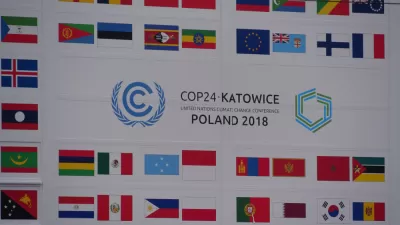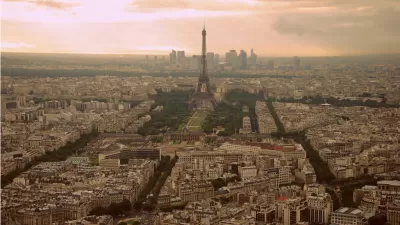After two weeks of negotiating in Paris, almost 200 countries agreed to a plan to reduce emissions, though not to the level supporters had hoped. Nonetheless, the COP21 agreement may be an 'inflection point in human history,' notes The Times.
"With the sudden stroke of a gavel on Saturday night, representatives of 195 countries reached a landmark climate accord that will, for the first time, commit nearly every country to lowering planet-warming greenhouse gas emissions to help stave off the most drastic effects of climate change," writes Coral Davenport who covers energy and environment policy for The New York Times.
With that, the delegates achieved what had been unreachable for two decades: a consensus on the need to shift from carbon-based fuels and a road map for the 195 nations to do so.
The decision to accept the document was unanimous. As President Obama tweeted, "this is huge." However, demonstrators argued that the accord was too weak.
Some key points reached in the agreement [emphasis added]:
- "At best, scientists who have analyzed it say, it will cut emissions by about half of what is needed to prevent an increase in atmospheric temperatures of 2 degrees Celsius, or 3.6 degrees Fahrenheit," writes Davenport. "That is the point, scientific studies have concluded, at which the world will be locked into devastating consequences, including rising sea levels, severe droughts and flooding, widespread food and water shortages, and more destructive storms."
- All countries, even developing ones, must commit to greenhouse gas reduction. Prior accords had exempted developing nations.
- Despite a strong push by developing nations to be compensated by wealthy nations for having to adapt to changes brought by global warming, the sum of $100 billion "appears only in a preamble, not in the legally binding portion."
- "The agreement sets a vague goal of having global emissions peak 'as soon as possible,' and a schedule for countries to return to the negotiating table every five years with plans for tougher policies," writes Davenport. "The first such meeting will take place in 2020."
- "Monitoring and verification had been among the most contentious issues, with negotiators wrangling into Saturday morning." [...] "The accord uses the language of an existing treaty, the 1992 United Nations Framework Convention on Climate Change, to require countries to verify their emissions and to periodically put forth tougher domestic plans."
Finally, to deal with the "United States" problem where two-thirds of the Senate is required to ratify treaties, a 'hybrid structure' was developed whereby "(s)ome elements of the accord are voluntary, while others are legally binding," writes Davenport.
Considering that 72 percent of Republicans, who hold 54 seats in the 100-member Senate, deny the existence of climate change, according to Jeremy Schulman of Mother Jones (via Grist), ratification would not be feasible.
Hat tip to Kenyon Karl.
FULL STORY: Nations Approve Landmark Climate Accord in Paris

Planetizen Federal Action Tracker
A weekly monitor of how Trump’s orders and actions are impacting planners and planning in America.

Maui's Vacation Rental Debate Turns Ugly
Verbal attacks, misinformation campaigns and fistfights plague a high-stakes debate to convert thousands of vacation rentals into long-term housing.

Restaurant Patios Were a Pandemic Win — Why Were They so Hard to Keep?
Social distancing requirements and changes in travel patterns prompted cities to pilot new uses for street and sidewalk space. Then it got complicated.

Charlottesville Temporarily Has No Zoning Code
A judge ordered the Virginia city to throw out its newly revised zoning code, leaving permitting for new development in legal limbo.

In California Battle of Housing vs. Environment, Housing Just Won
A new state law significantly limits the power of CEQA, an environmental review law that served as a powerful tool for blocking new development.

Boulder Eliminates Parking Minimums Citywide
Officials estimate the cost of building a single underground parking space at up to $100,000.
Urban Design for Planners 1: Software Tools
This six-course series explores essential urban design concepts using open source software and equips planners with the tools they need to participate fully in the urban design process.
Planning for Universal Design
Learn the tools for implementing Universal Design in planning regulations.
Heyer Gruel & Associates PA
JM Goldson LLC
Custer County Colorado
City of Camden Redevelopment Agency
City of Astoria
Transportation Research & Education Center (TREC) at Portland State University
Jefferson Parish Government
Camden Redevelopment Agency
City of Claremont




























